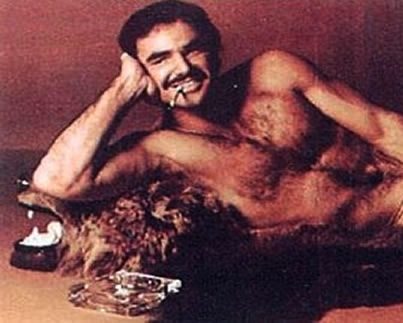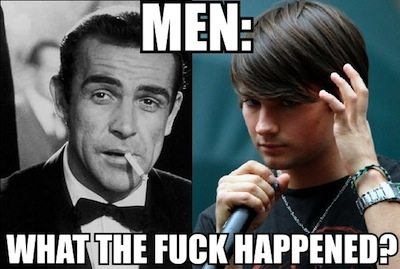« Previous 1 2 View All Next »
Give love advice to dudes for long enough and eventually you come up on the question of “What does it mean to be a man?”
At first, this question may sound like basic Philosophy 101 material, the same sort of intellectual masturbation that we think is, like, soooo deep after a couple of joints or bong hits at 3 in the morning in your dorm room. The first instinct is frequently to give a flippant answer and move on. “Being a man means being able to fold a map and never stop for directions.” “Being a man means getting yelled at for forgetting to put the seat down.”
Then you start to realize that, no, this is a serious question. For the last several decades, society has been grappling with this nebulous sense that somehow, we as a culture have “lost” what it means to be masculine. Sociologists, pundits, and writers – male and female, feminist and otherwise – have been wrestling with the idea of what makes a man, whether we’ve lost sight of it and if we have, whether this is a good or a bad thing.
The anxiety about what manhood manifests itself in myriad ways. As the economy crashed, news media began to run breathless articles about the “man-cession” – the struggle for men to find or keep work while women outnumbered them for the first time in the workplace. Universities were thought to have reached a point of crisis as male attendance began to wane and the performance of male students flagged behind women. Pop culture brings us shows like Mad Men wade into the nostalgia of a lost era when “men were men” while fantasy series such as The Walking Dead or Game of Thrones externalizes the concept of masculine power versus feminine in a realm where the rules as we know them have been tossed aside and every day is a literal struggle to survive. Movies celebrate the overgrown man-child and what it means to grow up. Men, desperate for an external source to help quell the insecurity and nagging feeling that something is missing turn to groups that promise to restore that feeling of “manliness”, whether it’s the Promise Keepers or the Pick Up Artist community.
Society tells us that we’ve lost something… but nobody seems to knows what, exactly, that it was, or how we lost it. Some blame women for stealing it from us, or for convincing us to give it away. Some blame our culture and how it’s evolved. All we know is that something is off, but we don’t know why or what to do about it, so we’re casting about for answers.
The idea of a growing “masculine crisis” is a popular one; it externalizes the feeling of angst about who we are as men and what we’re supposed to be doing. Now instead of a nebulous feeling, it’s something we can understand: it’s a threat, a problem… something we can take action on rather than sitting around and worrying about it. Of course, to do that, we’d need a better idea of just what the issue is… but never mind that! Crisis! Rawr!
So… let’s talk about it. What does it mean to be a man in the 21st century? Strap yourself in, this is gonna be a long one.
Where Have All The Good Men Gone?
Being a man used to be simple; he was a leader, a beacon of strength and order in a chaotic world. Men were strong. Men were the rulers. Hell, men made the rules. The world was a large and scary place and it required power and strength to beat it into shape. Issues felt clear and simple; we all had roles given to us by virtue of biology and reinforced by society. There were clear sign posts on what was masculine and what was feminine and we had these rules handed down to us from father to son for generations. It was a simpler time and a simpler society1
Then society done went and changed on us.
Now, roles are murkier and role-models are fewer and far between. More and more men find themselves cast adrift as traditional gender roles have been upended and formerly tolerated behaviors are considered to be taboo or boorish. The concept of “man as patriarch” is increasingly uncommon; in fact, more and more children are raised by single mothers – approximately 9.9 million households according to the 2009 census. The typical “ideal look” for men – as evidenced by pop culture and advertising is increasingly youthful with less muscular definition, softer features and markedly less body hair; that is to say, more feminine than the 70s and 80s when the masculine ideal was considerably more mature and hirsute.

Moreover the concept of “man-as-provider” has been overturned; previously, the traditional role of a man was not just the head of the household but as the one who was singularly responsible for it’s financial security. A man’s identity was tied intimately to his career; what you did was an integral part of who you were. Today, the concept of the “career man” is almost non-existant; a man can expect to be an economic nomad, working one job for approximately 3 to 5 years before moving on. Worse, a man who wants to raise a family can take it for granted that – unless he has either been born to privilege or manages to strike it rich in some way, shape or form – it will almost certainly require a two-income household to provide an equivalent lifestyle to what his parents or grandparents enjoyed.
Men today feel as though they’ve been cast adrift, caught in a maelstrom of confusing and often contradictory indicators and messages. With fewer distinct role models in their lives to provide guidance and society in such flux, economically and socially, men are frequently flailing about for meaning and definition.
Now, let’s be clear: when we’re talking about the change in the definition of masculinity, we’re talking about within the last 40 to 50 years; you aren’t going to find many people agitating to get back to the days of pre-Enlightenment Europe, and even the hardest of the hard core SCA participants will freely and cheerfully acknowledge that they’re celebrating a fantasy version of history. In post-World War 2 America, the world was black and white. America had just emerged as a new world power following a morally “clear” war. The engines of commerce and industry were churning along at full speed as the we shifted away from a wartime economy and back to “business as usual”, bolstered by technological advances. For (white) men, the world was their oyster. It felt like success and prosperity were well within reach; all that was needed was a willingness to work hard and you could give a better future to your children. Men were men, women were women; men knew their purpose and women knew their place. God was in His heaven and all was right in the world.
Which, of course, meant that things were about to change.
What Happened?

A short answer is: The 60s.
A slightly longer, more helpful answer is that it was a mix of societal adaptation to greater financial and personal security and the advancement of technology.
Society and culture does not exist in a vacuum; everything about our culture is shaped by exterior influences. The post-World War II America was experiencing unparalleled growth and economic success. Pent up frustrations lead to increased consumer demand for goods. Housing sales surged, buoyed in no small part by cheap and easily-acquired mortgages and the advances in aviation or electronics connected us to the world in ways that were never possible before. It also lead to the population explosion known as The Baby Boom.
When a society enjoys increased prosperity and safety, social roles adapt. The increased prosperity allowed for greater civil change, especially in a generation growing up connected to the world at large in a way that the previous hadn’t been. Cultural borders were starting to melt and blur thanks to telecommunications. Increased social awareness across the board was leading towards the fight for civil rights for minorities.
And in 1960, the FDA approved the Pill for use in contraception. Suddenly the ability to discretely and conveniently control their reproductive system meant that women had levels of opportunities that they never had before. Being able to control their fertility meant that women could delay marriage and opt instead for education and careers. In fact, female enrollment in higher education spiked sharply in the years following the approval of the Pill. In addition, having the freedom to engage in sex without fear of pregnancy permanently altered female sexuality; women now had the same sexual freedom that men enjoyed and were looking forward to exercising their newfound agency.
((The Pill may well also have had a hand in changing the sexual ideal for men. Women who are ovulating are drawn to men with indicators of higher levels of testosterone – thicker brows and jawlines, heavier musculature and deeper voices. A woman in her infertile stages of the menstrual cycle are drawn to more feminine men – ones with less masculine faces and builds. Because the Pill mimics pregnancy and flattens out a woman’s hormonal cycle, it can influence what types of men a woman is attracted to for as long as she takes it. When you consider that the Pill is the single most popular form of birth control, it does make one question its effect on the masculine sexual ideal in our culture.))
Add to that the publication of The Feminine Mystique and the birth of the Second Wave of Feminism, which focused on pushing back against sexism and discrimination in society. Women were fighting for equal social footing with men and forcing a cultural dialogue on the role of women socially, sexually and politically. This, incidentally helped change the definition of “marriage” by leading to changes in divorce law in the US, making it easier for men and women to dissolve marriages without interference from an opposing partner.
The cumulative effects of all of these events set us on the course to where we are today. Socially, women are closer to full equality than they have ever been before; men, on the other hand seem to be reeling from the sudden changes.
Related Posts
- or so we like to think; we have a tendency to romanticize the past and smooth over the rough edges. This is why as far back as Plato’s time you will find people complaining about how kids today don’t respect their elders and run wild, not like it was in the good ol’ days. [↩]
« Previous 1 2 View All Next »






